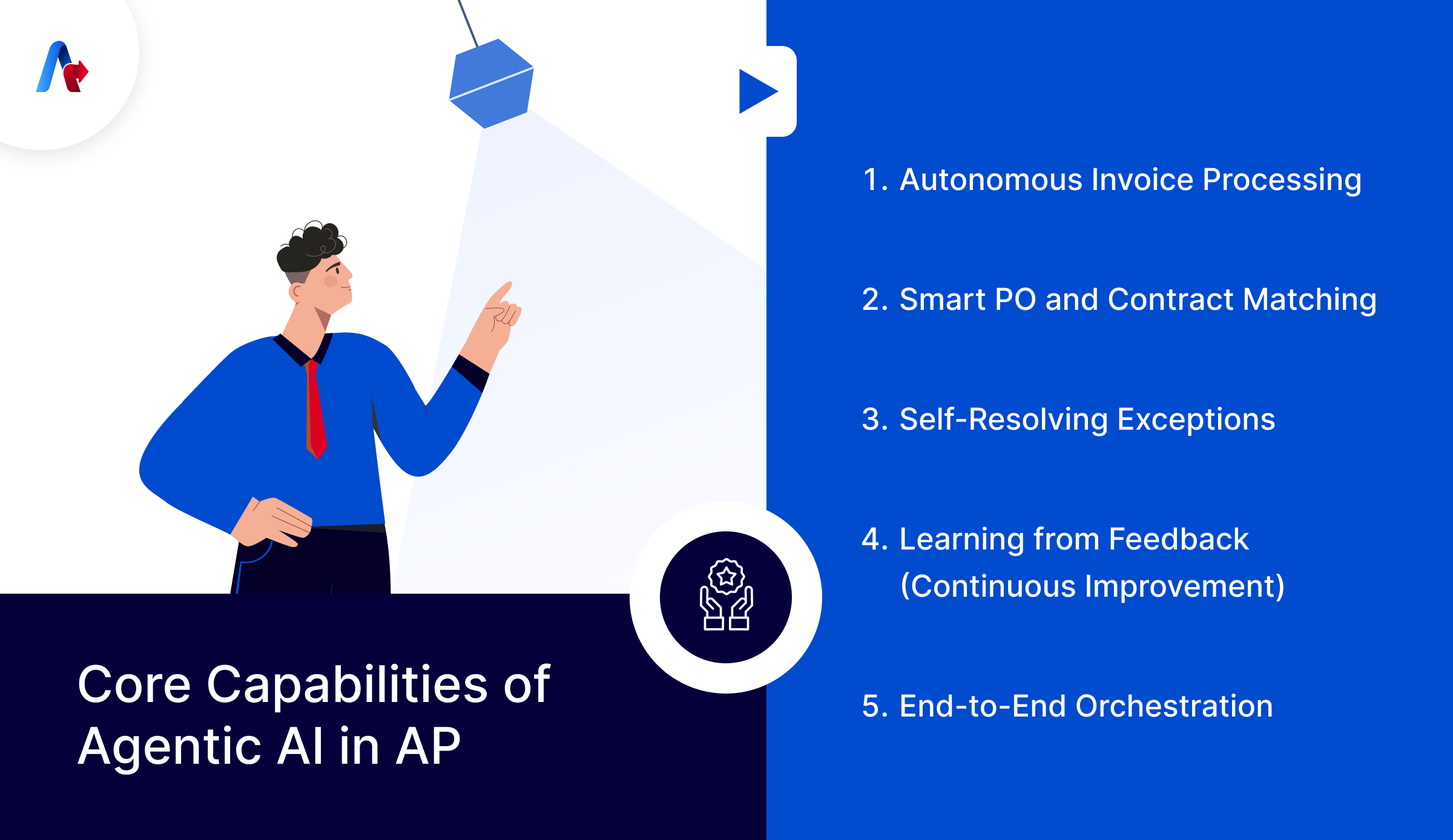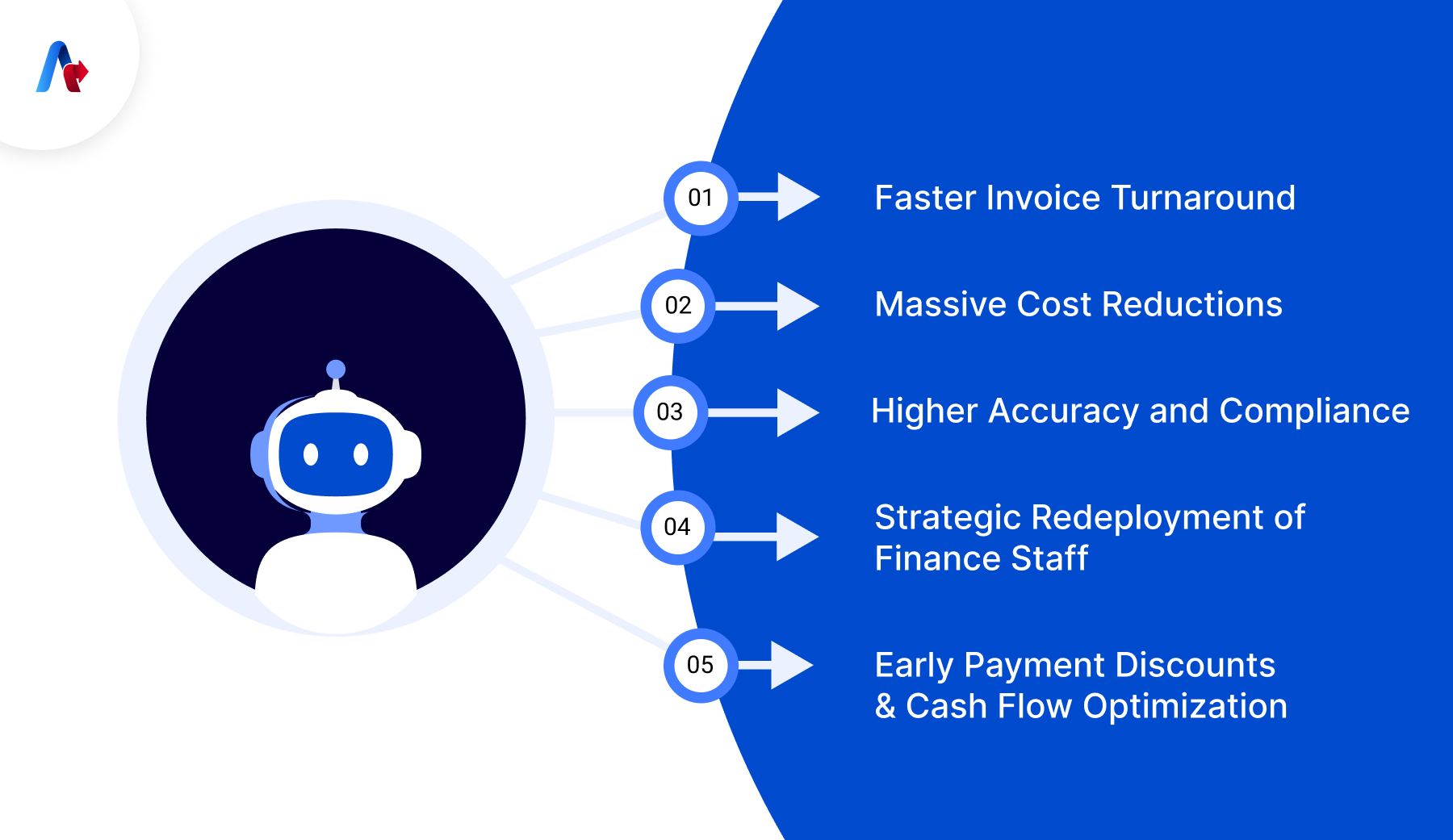Agentic AI for Accounts Payable
BLOG
12 min read
Agentic AI for Accounts Payable: Automating Invoices with Intelligence
Quick Summary
One of the areas where Agentic AI is changing invoice processing in companies is the Accounts Payable. Unlike the traditional automation, Agentic AI uses intelligent, self-enhancing agents that can handle unstructured invoices, address exceptions, and make immediate decisions without human involvement. Such agents may automate up to 95 percent of AP processes, which increases accuracy, reduces cost and increases the speed of payments. Besides smart PO matching, Agentic AI offers a variety of features such as fraud detection and an optimized cash flow plan which makes AP a proactive, value creating process.
The accounts payable (AP) process is the lifeblood of any business’s financial operations. But in many enterprises, it remains heavily manual, slow, and error prone.
This is where Agentic AI for Accounts Payable is driving a powerful shift—from routine automation to autonomous, intelligent financial operations.
Unlike traditional, rule-based AP bots, AI for AP is now built to include agents who can understand context, make decisions, learn from data, and train to collaborate with humans. AI-powered agents are changing AP into a strategic powerhouse to drive efficiency in speed, decrease risk, and access cash flow opportunities.
Understanding Agentic AI in Accounts Payable
Agentic AI is used to control software agents that are goal -focused, context-aware and constantly learning. These agents can process complex invoices, including payment authorization, without the intervention of a human in the context of accounts payable.
They’re not just tools that “follow rules,” but intelligent coworkers that analyze, adapt, and execute across dynamic financial environments.
Core Capabilities of Agentic AI in AP

Autonomous Invoice Processing
Handles invoices from multiple formats—structured (EDI), semi-structured (PDF), and unstructured (email bodies or scans)—with high-accuracy data extraction using intelligent document processing (IDP).
Smart PO and Contract Matching
Automatically compares purchase orders (2-way or 3 way matching), delivery receipts, or contracts to invoices. Is even able to:
- Price or quantity mismatches
- Missing PO numbers
- Duplicate entries
Self-Resolving Exceptions
Agentic AI for accounts payable can detect:
- Tax misclassifications
- Overcharges or unauthorized vendors
- Incomplete invoice fields
The system can automatically resolve these issues or escalate them to a human approver for further review.
Learning from Feedback (Continuous Improvement)
These agents are powered by machine learning models that learn from:
- Historical approvals and rejections
- Corrections made by AP staff
- Patterns in vendor or invoice behavior
This overtime reduces the exceptions and increases straight-through processing.
End-to-End Orchestration
Agentic agents can:
- Update ERP systems (SAP, Oracle, NetSuite)
- Trigger payment cycles
- Notify stakeholders of delays or compliance issues
- Coordinate with other agents in procurement or compliance functions
Agentic AI can handle up to 95% of AP processes touchlessly, according to Automation Anywhere.
Automate up to 95% of AP processes with intelligent AI agents.
Get expert advice todayHow Agentic AI works for AP Operations
Here’s a closer look at how Agentic AI for accounts payable operates within a modern finance environment, turning manual-heavy processes into autonomous, intelligent agentic workflows:
1. Invoice Ingestion
Agentic AI extracts invoices from all types of sources - including emails, vendor portals, EDI systems, scanned PDFs, and handwritten forms. It extracts header and line level information much more accurately, using AI-powered document understanding, unlike the basic OCR.
Extracted data includes:
- Invoice number
- Vendor details
- Dates, amounts, tax IDs, line items, payment terms
Formats handled:
- Structured (EDI), semi-structured (PDFs), and unstructured (email text or image scans)
This step alone can reduce manual data entry effort by over 80%.
2. Validation and Compliance Checks
Once data is extracted, AI for accounts payable agents perform real-time validations by:
- Matching invoice data with corresponding purchase orders (2-way) and goods receipts (3-way)
- Verifying tax codes, vendor contracts, currency conversion rates, and regional compliance rules
Agents can also detect inconsistencies such as:
- Price/quantity mismatches
- Missing PO references
- Invalid vendor information
These intelligent checks reduce human error and strengthen audit readiness.
3. Exception Handling
Not all invoices fit into a certain formula. This is where Agentic AI works best. It uses machine learning algorithms trained on historical resolutions to self-handle basic exceptions such as:
- Duplicate invoices
- Overcharges
- Incomplete or mismatched data
If the issue is complex or confidence is low, the agent will escalate to a human AP analyst—with full context and suggested next steps.
This hybrid model allows for speed without sacrificing accuracy or control.
4. ERP Update & Payment Trigger
Once an invoice is validated and approved, the agent updates the organization's ERP system (such as SAP, Oracle, or NetSuite) in real time:
- Posts journal entries or payables records
- Applies approval stamps or tags
- Triggers payment based on due dates, early-payment discount opportunities, or custom rules
This enables a smooth interaction between AI agents and ERP systems that removes any delays and provides a consistent, touchless AP cycle.
5. Learning and Adaptation
Perhaps the most powerful capability of Agentic AI for accounts payable is its ability to learn continuously. Each interaction—successful or exceptional—becomes training data. Over time, the agent:
- Refines invoice classification and data extraction accuracy
- Learns vendor-specific patterns and preferences
- Optimizes exception handling paths
- Improves the decision-making logic based on outcomes
The system gets smarter with each invoice processed—reducing reliance on human input over time.
Key differences from traditional AP automation
| Feature | Traditional AP Automation | Agentic AI for Accounts Payable |
|---|---|---|
| Invoice Format Handling | Structured only | All formats (structured + unstructured) |
| Workflow Execution | Sequential, rule-based | Goal-driven, multi-path, adaptive |
| Exception Resolution | Mostly manual | AI-led with human fallback |
| ERP Integration | Limited | Seamless, real-time updates across platforms |
| Learning Ability | None | Continuously learns and improves |
| Human Dependency | High | Low to moderate (depending on workflow) |
Benefits of agentic AI in Accounts Payable

Adopting Agentic AI in accounts payable is more than automation, it is the conversion of AP into a strategic powerhouse. These agents do more than accelerating the processing of invoices. They enhance financial accuracy, decrease operational costs, and open new opportunities to make strategic decisions.
1. Faster Invoice Turnaround
In the case of traditional AP workflows, invoice processing takes 5-10 days or more, particularly when exceptions or manual validations are required. Agentic AI significantly reduces this duration by providing real-time capture, validation and exception resolution of the data.
- Enterprises that utilize AI for accounts payable report processing are able to process over 80% of invoices on the same day they are received.
- Straight-through processing (STP) increases, reducing backlogs and delays.
Result: Shorter payment cycles, stronger vendor relationships, and improved service-level agreements.
2. Massive Cost Reductions
Manual AP operations are time-consuming, inaccurate and costly. The use of agentic AI minimizes manual efforts by automating the end-to-end processing of invoices.
According to Medius, organizations can cut AP processing costs by up to 80% by switching to agentic systems.
Result: Leaner AP teams, reduced reliance on outsourcing, and higher return on technology investment.
3. Higher Accuracy and Compliance
Agentic AI for accounts payable minimizes the risk of financial leakage by catching:
- Duplicate invoices
- Overpayments
- Tax calculation errors
- Non-compliant transactions
As accuracy rates are up to 99.9%, businesses can enjoy more accurate records, enhanced audit trails and automated gain verification checks based on both internal control and external regulation.
Result: Fewer errors, better fraud prevention, and smoother audits.
4. Early Payment Discounts & Cash Flow Optimization
With faster processing and real-time visibility, finance teams can strategically time invoice approvals to take advantage of early payment discounts and avoid late fees.
Businesses using intelligent AP systems can capture 2–3x more early payment discounts.
Result: Improved working capital, stronger supplier incentives, and healthier cash flow management.
5. Strategic Redeployment of Finance Staff
By offloading repetitive tasks to AI agents, finance professionals can shift their focus toward:
- Spend analysis and optimization
- Financial forecasting
- Vendor performance evaluations
- Contract negotiations and strategic sourcing
This leads to a more insight-driven and proactive finance team, capable of contributing to broader business goals.
Result: AP becomes a strategic function—not just a cost center.
Challenges and considerations while implementing agentic AI in AP
With all the promise of Agentic AI in accounts payable, a roll-out is not a plug-and-play process. It involves careful planning, robust data bases and change management. Key challenges enterprises need to expect-and how most are dealing with them below:
Data Privacy & Security
The Challenge: Financial documents can be very sensitive - vendor data, tax IDs, account numbers, and contract terms. Mismanagement of this data will present risks of compliance and trust.
Enterprise Response:
- Implementing role-based access controls
- Encrypting data at rest and in transit
- Adhering to compliance frameworks like SOX, GDPR, HIPAA
- Leveraging secure, on-prem or hybrid-cloud deployments
Security must be integrated into every stage of the AP automation lifecycle.
Change Management
The Challenge: Shifting from manual or rule-based AP to an agentic model often faces internal resistance—from users unsure of the technology to leadership concerned about disruption.
Enterprise Response:
- Running pilot programs before full rollout
- Training AP teams and finance stakeholders
- Communicating clear benefits across roles
- Aligning AI adoption with broader digital transformation efforts
People are more likely to trust AI if they’re part of its implementation.
Tool & Platform Overload
The Challenge: Many enterprises already use multiple tools—OCR software, ERPs, procurement platforms, etc. Adding another layer of automation can create silos and integration headaches.
Enterprise Response:
- Using centralized orchestration platforms to connect systems
- Ensuring Agentic AI integrates natively with ERPs (SAP, Oracle, NetSuite)
- Creating unified dashboards and shared data pipelines
Integration is key to unlocking the full value of Agentic AI in AP.
Data Quality & Process Standardization
The Challenge: Agentic AI learns from historical data—but inconsistent formats, exceptions, or outdated workflows can slow down learning and lead to errors.
Enterprise Response:
- Cleaning and standardizing historical AP data
- Defining exception scenarios and business rules
- Using feedback loops to continuously train the system
Well-structured data accelerates AI performance and reduces exceptions.
Governance and Oversight
The Challenge: With autonomous systems making financial decisions, enterprises/ need guardrails to ensure transparency and accountability.
Enterprise Response:
- Establishing AI governance frameworks
- Setting thresholds for decision autonomy
- Maintaining audit trails and review logs
- Appointing cross-functional AI oversight teams
You’re not just automating AP—you’re designing a system that earns trust.
Future of Intelligent Decision-Making in Accounts Payable
The direction is clear: Accounts Payable is moving toward automated, fully intelligent, and fully independent. Operating with the help of Agentic AI, future AP operations will not simply be automated; they will have strategic thinking ability, act proactively and collaborate across functions.
Here’s what the next stage of AI for accounts payable looks like:
Predict Payment Delays
With the help of historical payments, supplier behavior, and internal processing patterns, agentic systems with real-time prediction capabilities will be able to anticipate bottlenecks.
- In case the invoice contains missing documents or can be referred to a pattern related to historical delays, the AI agent will be able to intervene in advance- alerting the appropriate team or automatically triggering nudges.
- This means that finance departments will be able to avoid late payments rather than responding after they have occurred.
Result: Improved supplier confidence and penalties charges mitigation.
Recommend Optimal Cash Allocations
In addition to making payments, Agentic AI will evaluate cash positions in real-time, upcoming payments, and vendor discount offers to recommend optimal pay time.
- As an example, agents may prioritize the invoices that provide a discount for early payment or post-pone those payments that will not have an impact on supplier performance.
- Such decisions are refined via predictive analytics and payment outcome tracking.
This results in better working capital management and an increase in the capture of discounts.
Detect Fraud Before It Happens
Rather than blindly relying on fixed fraud rules, agentic AI will be able to detect and prevent suspicious transactions through anomaly detection and pattern recognition in real-time.
- It is able to identify abnormal invoice patterns, unusual changes to vendor bank information, mismatches across connected documents.
- Such red flags are flagged or escalated prior to disbursing funds.
Result: A stronger financial protection and a reduced exposure to frauds.
Collaborate with Other AI Agents
The AP agents will not be isolated in the future. The thing is that they will collaborate with agents in procurement, finance, and compliance to make the decisions coordinated, share data and perform as a team digital team.
- Regulatory issue may be flagged by a compliance agent.
- A procurement agent has the authority to modify a contractual term.
- A procurement agent has the authority to modify a contractual term.
Result: Integrated financial activities and less human coordination.
Discover how Agentic AI can transform your AP process
Talk to Our AI ExpertsConclusion
Accounts payable agentic AI is not just a trend, but a transformation. These AI agents are saving money, increasing compliance and allowing teams to work at higher levels.
Early adopters among companies will not only realize the benefits of improved business operations, but also open new sources of revenues by accelerating financial cycles and improving the cash management.
The issue is not whether enterprises should use Agentic AI solutions, but how soon they can implement them.
FAQs
Yes. With Agentic AI, up to 95% of AP processes can be automated with minimal human intervention.
Absolutely—enterprise-grade implementations include data encryption, audit logs, and regulatory compliance (e.g., GDPR, SOX).
Automation Anywhere’s deployment saved $635K/month for a healthcare firm through invoice processing automation.
Start with a focused pilot, set governance, and choose the right ERP partner. Connect with Accelirate to work with AI experts and begin your process assessment.
The future of accounts payable is an entirely autonomous AP system that is predictive, smart and integrated with your wider finance ecosystem.


